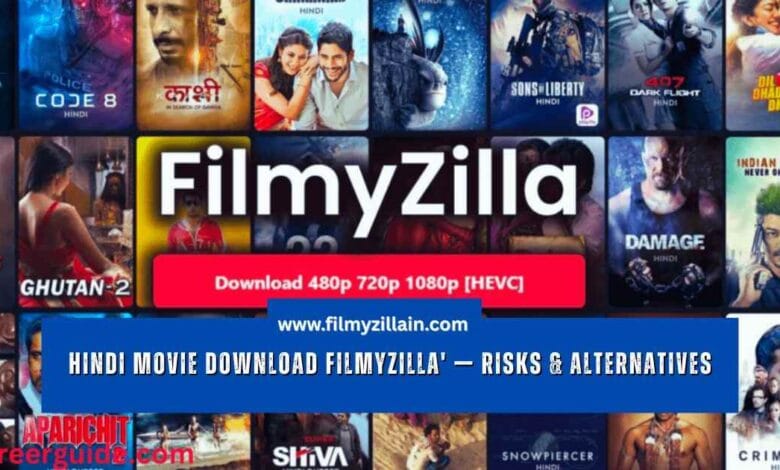Hindi Movie Download Filmyzilla’ — Risks & Alternatives

If you searched for hindi movie download filmyzilla, you were likely trying to find a free copy of a Hindi film to watch offline. That search phrase is commonly associated with piracy sites and illicit downloads. This article explains what that search implies, why people use such sites, and most importantly the real legal, technical, and personal risks involved. It also provides clear, practical alternatives so you can watch Hindi films safely and legally. The goal here is to help you make informed choices: enjoy films, protect your device and identity, and support creators in ways that don’t cause harm.
Why people search for “hindi movie download filmyzilla” (cost, convenience, availability)

Three consistent drivers push people toward searches like hindi movie download filmyzilla:
- Cost pressures. Subscriptions add up. When someone wants to see a single film but has multiple monthly services to consider, the temptation to seek a “free” copy grows. For students, low-income viewers, and people who do not want recurring fees, piracy looks like a quick budget-friendly option.
- Offline convenience. Travel, unreliable mobile data, and the desire to keep an offline copy for repeated viewing make downloads attractive. Official apps often offer legitimate offline downloads, but users sometimes turn to unauthorized sources because they appear faster or promise simpler file access.
- Availability gaps. Not every Hindi film appears everywhere at the same time. Some regional films, older titles, or newly leaked releases may not be available on the platforms a viewer already subscribes to. That lag creates demand for alternative sources.
Understanding these motives is essential for building better, legal options that meet the same needs: lower-cost rentals, ad-supported libraries, short-term subscriptions, and timely official releases. But motive doesn’t change the risks which we look at next.
Legal risks: Is downloading from Filmyzilla illegal? (penalties, Indian law overview)
Downloading movies from unauthorized sources is unlawful in many countries, including India. Copyright law protects films, and unauthorized downloading, copying, or distributing can lead to legal consequences. Consequences differ depending on the area and the seriousness of the offense; they might involve civil liabilities such as fines and damages, and in very severe situations, there could be criminal penalties.
Practical realities matter: while many individual downloaders are rarely pursued by criminal authorities, rights holders prioritize takedowns, site-blocks, and cases against large-scale distributors. Uploading or sharing pirated files not just downloading escalates risk, as it contributes to distribution networks authorities actively target.
For individuals, the safest posture is clear: avoid downloading or distributing copyrighted material from pirate sources. Legal platforms exist with safer, higher-quality alternatives. Making the legal choice avoids uncertainty and potential legal costs down the line.
Malware & security risks of pirate download sites and apps (how users get infected)
Piracy sites and unofficial streaming apps are a major vector for malware and scams. Several common infection paths exist:
- Fake download buttons and popups. Pirate pages use deceptive interface elements that look like the real download link but point to malicious installers. Clicking these can trigger downloads of adware, trojans, or spyware.
- “Codec” or “player” installers. Some pages claim you need a special player or codec to view content; the suggested download is often disguised malware. Once installed, these programs can harvest passwords, record keystrokes, or open backdoors.
- Bundled installers. Files packaged as a single installer may silently include additional unwanted software. Even if the main file appears benign, bundled extras can do the damage.
- Malvertising and redirects. Ads on pirate sites can silently redirect users to exploit kits or phishing pages that attempt to load malicious code into a browser or trick users into giving up credentials.
- Infected archived files. Downloaded video files sometimes contain hidden executables or scripts. Opening them on a system that executes unknown file types can run malicious code.
The consequences of an infection extend far beyond a single device: attackers can steal banking details, compromise email accounts, and use messaging or social media accounts to propagate scams. The immediate “free” benefit of a pirated movie can therefore lead to far greater financial and emotional costs.
How piracy sites like Filmyzilla typically operate (mirrors, popups, fake installers)
Pirate networks are structured to persist and profit despite efforts to shut them down. They commonly use these tactics:
- Mirror and clone domains. When authorities or service providers block a domain, operators spin up clones or mirrors with different names. The result is a shifting landscape of addresses that confuses users and evades enforcement.
- Aggressive monetization. Pirate sites rely on advertising, affiliate scams, and pushy popups to monetize traffic. Many of these ad networks are low quality and serve malicious or deceptive creatives.
- Social and messaging distribution. Instead of relying solely on search discovery, operators leak links via messaging apps and social channels, which helps them reach audiences while evading indexing.
- Third-party file hosts and torrents. Pirate pages frequently link to third-party storage services or torrent swarms. This reduces hosting costs and makes takedown efforts more complex.
- Fake “premium” offers. Users are sometimes shown offers to “upgrade” for faster download or higher quality; those offers are usually scams or require installing risky software.
The combination of evasive domain practices and aggressive monetization is what makes these operations both profitable and dangerous for casual users. Trusting such a site exposes you to legal uncertainty and real security hazards.
Real consequences (identity theft, bank fraud, device compromise, poor quality)
Using pirate downloads for the search hindi movie download filmyzilla can produce real, measurable harms:
- Device compromise. Malware can create persistent access for attackers, who can then control the system remotely, exfiltrate files, or use the device as part of a botnet.
- Identity theft. If credentials are captured through phishing forms or malware, attackers can take over financial accounts, apply for credit in the victim’s name, or sell personal data on underground markets.
- Fraud in finance. can occur through counterfeit payment websites or subscription scams related to illegal content, which may lead to stolen card information or encourage victims to provide their banking details.
- Privacy breach. Torrents and P2P sharing expose your IP address and connection details to many anonymous peers. In some cases, that exposure has been used for harassment or civil claims.
- Poor viewing experience. Pirated files are often low quality, corrupted, or incomplete. The effort to find and download a usable copy often outweighs the convenience.
- Collateral damage. Family members or other devices on the same network can be compromised, especially if an attacker uses lateral movement techniques after gaining initial access.
All these consequences are avoidable by using legal and reputable sources for films.
Safe, legal alternatives to Filmyzilla (streaming, rental, free ad-supported options)
If your end goal is to watch Hindi films safely and affordably, the following legal options meet almost every need:
- Subscription streaming services. These platforms provide large libraries and official apps that support offline downloads inside the app environment. Offline playback via the official app protects you from malware and unauthorized installers and gives consistent playback quality and subtitles.
- Digital rental and purchase. Renting a movie for a low fee or buying a digital copy ensures you get a high-quality file and the legal right to view it. Many rental platforms allow temporary offline downloads.
- Free ad-supported platforms. Licensed ad-supported services offer a catalog of films at no subscription cost, supported by safe advertising systems. These platforms are curated and controlled, unlike the unpredictable ad inventory on pirate sites.
- Local cinema and timed windows. For new releases, watching in theaters or waiting for an official home release supports the film industry and guarantees the best viewing experience. Timed digital windows mean a film will reach legal platforms shortly after theatrical runs.
- Library and educational resources. Public libraries and cultural institutions sometimes offer film programs or streaming access to classic and independent content.
Choosing those legal options not only reduces your personal risk but also channels revenue back to the creators who make the films you love.
How to check a streaming site/app before you use it (red flags checklist)
Use this checklist before installing an app or trusting a website:
- Company transparency. Legitimate platforms show clear corporate information and support contacts.
- App store presence and reviews. Official apps should be available on recognized app stores with a reasonable volume of reviews and consistent developer details.
- No forced downloads. A reliable streaming service streams in-browser or within an official app; it doesn’t require you to download external “players” or codecs.
- Minimal and controlled ads. While free services use ads, legitimate ones do not subject you to endless popups or forced redirects.
- Privacy policy and permissions. Check what permissions an app requests; streaming apps normally need media access and storage but not access to contacts or SMS.
- Content plausibility. If a site is offering a brand-new theatrical release for free immediately upon release, be skeptical.
- Technical hygiene. Look for proper HTTPS, secure payment methods, and clean site design; many scam sites are riddled with spelling mistakes and broken pages.
If a potential platform fails many items on this checklist, avoid it. Prioritize established, reputable services.
What rights-holders and governments are doing about piracy (takedowns & blocks)
Rights-holders and governments employ legal and technical strategies to reduce piracy. Action typically includes:
- Takedown notices. Copyright owners send notices to platforms and hosts requesting removal of infringing content.
- Court orders and ISP blocks. Courts in many countries can order internet service providers to block domains that distribute pirated content.
- Civil and criminal enforcement. Authorities pursue large-scale operations and distributors, while civil suits can be used to recover damages.
- Cross-border cooperation. International collaboration aims to shut down hosting and distribution channels that operate across jurisdictions.
- Public awareness and education. Rights-holders also invest in campaigns to inform users about legal options and the harms of piracy.
The dynamic nature of enforcement mirrored domains, alternate hosts, and social channels means piracy is constantly changing. For consumers, this instability is a practical reason to favor official platforms: pirate resources come and go, often leaving users exposed and with no reliable access to content.
Conclusion
If you’ve used searches like hindi movie download filmyzilla, step back and consider safer paths. The dangers related to legal issues and security are very real and can frequently lead to high expenses. Concrete next steps:
- Use official apps for offline viewing. Official apps offer built-in download features that work without installing unknown software.
- Consider short-term rentals or trials.Renting a single movie or trying a short subscription trial is both affordable and secure.
- Try ad-supported legal services. These let you watch without recurring fees and avoid malware risk.
- If you visited a suspicious site, run a full malware scan. Change passwords for critical accounts and monitor bank statements.
- Support creators. Choosing legal viewing helps sustain the industry that produces new films.
Choosing a legal, verified source protects your device, finances, and privacy — and ensures creators get paid for their work.
FAQs
Q: Can I get in trouble for downloading movies from a pirate site?
A: Yes. Downloading or distributing copyrighted content from an unauthorized source is illegal in many places. Legal consequences range from civil claims to criminal penalties, although enforcement priorities vary. Avoid downloading from pirate sites to reduce legal exposure.
Q: Is searching for “hindi movie download filmyzilla” illegal?
A: Searching alone is not the same as committing an offense, but acting on pirate download links by downloading or sharing infringing content can be unlawful and risky.
Q: Are torrents safer than direct download sites?
A: No. Torrents expose your IP address to many peers and can easily distribute files that include malicious content. Both torrenting and unknown direct-download sources pose security and privacy risks.
Q: I want offline copies — what is the safest method?
A: Use the official download feature inside a verified streaming app. These downloads are designed to work within the app, without requiring third-party installers or exposing you to risky files.
Q: My device seems infected after visiting a pirate site — what should I do?
A: Run a trusted anti-malware scan immediately, remove suspicious programs, change critical passwords (email, banking), and monitor financial accounts. If issues continue, think about seeking expert assistance or resetting the device.
Q: Are free streaming sites always illegal?
A: Not always. Some free platforms operate legally with licensed content and ad support. The key question is whether the platform has the rights to distribute the film. Be cautious when a site offers recent theatrical releases for free.





